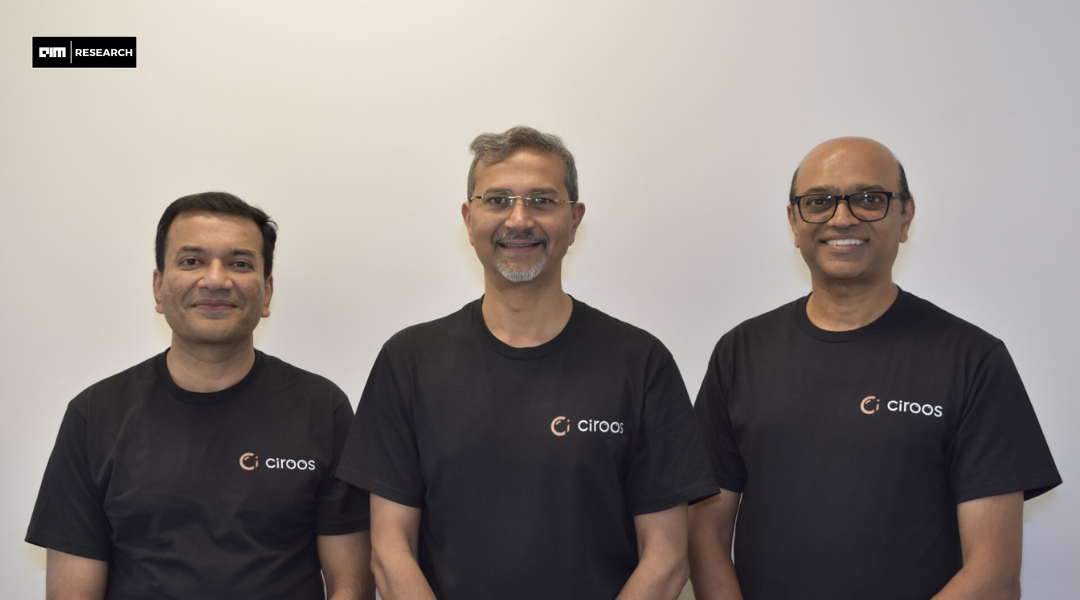
“We Built Our AI SRE Teammate To End That Toil,” Says Ciroos CEO After Landing $21M Funding
- By Upasana Banerjee
- Published on
While AI can dramatically accelerate incident response, human judgment and oversight remain crucial.


The dreaded buzz of a phone at 2 AM. The frantic scramble to diagnose system failures while bleary-eyed engineers desperately hunt through dashboards for clues. For decades, this has been the unglamorous reality of enterprise operations, a world where site reliability engineers (SREs) and DevOps teams bear the crushing weight of keeping critical systems alive, often at the expense of their own sleep and sanity.
But what if those middle-of-the-night emergencies could become a thing of the past?
That’s the idea that is driving Ciroos, a startup that just secured $21 million in funding to fundamentally reimagine how enterprises handle operational crises. Led by Energy Impact Partners LP, this investment signals growing recognition that the traditional approach to enterprise operations drowning teams in dashboards and reactive firefighting is not just inefficient, it’s unsustainable.
The irony isn’t lost on Ronak Desai, Ciroos co-founder and CEO, who spent years watching the same story unfold across companies of every size. “More tools, more data, more dashboards… but not more answers,” he reflects, drawing from decades of experience scaling systems at tech giants like Cisco, AWS, and Gigamon.
The numbers tell a stark story. Despite massive investments in monitoring and observability tools, incident resolution still takes far too long. Root cause identification remains a manual, time-consuming process that often involves hundreds of expert responders scrambling to connect dots across fragmented systems. Meanwhile, the operational burden is only intensifying as AI-powered development tools enable faster releases and more complex deployments.
It’s a classic case of success breeding its own problems. As developer productivity skyrockets thanks to AI coding assistants, the resulting operational complexity threatens to overwhelm already stretched SRE teams. The very innovations designed to make software development faster and smarter are inadvertently making operations harder and more chaotic.
Ciroos isn’t trying to add another tool to the already crowded operations landscape. Instead, they’re proposing something fundamentally different: an AI SRE Teammate that thinks like an expert human but operates at machine speed.
This isn’t a typical monitoring solution that simply collects more data points. The company’s multi-agent system is designed to reason through operational challenges with the sophistication of a seasoned engineer detecting anomalies, correlating signals across domains, and even initiating investigations before human experts are even aware there’s a problem.
The technical architecture is notably forward-thinking. Built on the recently announced Model Context Protocol (MCP) and Agent-to-Agent (A2A) frameworks, the system is designed for extensibility. This means enterprises can integrate their own specialized AI agents or adopt solutions from other vendors, creating a collaborative ecosystem rather than another siloed tool.
“We don’t need runbooks,” Desai explains. “It gets to work instantly to tell you what’s not a problem and to solve what is.”
Perhaps most importantly, Ciroos maintains that humans remain in control. Rather than pushing for full automation, the platform offers graduated levels of assistance from augmenting human decision-making to enabling fully autonomous operations when appropriate. This nuanced approach acknowledges that while AI can dramatically accelerate incident response, human judgment and oversight remain crucial.
The company’s founding team brings serious credibility to this vision. With 84 patents across AI, observability, distributed systems, and cybersecurity, and experience scaling businesses from pre-revenue to billions in valuation, they understand both the technical challenges and the business imperatives driving enterprise operations.
The timing couldn’t be better. As enterprises grapple with increasingly complex, AI-native applications that exhibit probabilistic behaviors and dynamic interdependencies, traditional operational approaches are showing their age. The old model of static runbooks and reactive dashboard monitoring simply can’t keep pace with modern distributed systems.
“SREs carry a heavy burden,” Desai notes. “We built our AI SRE Teammate to end that toil, fully embracing our mission to provide an AI SRE Teammate that empowers SREs to be superheroes.”
Early results are promising. The company claims their SRE Teammate can slash incident response times by 90%, a metric that, if sustained at scale, could transform how enterprises think about operational reliability.
Ciroos represents a broader shift toward AI-native operations that recognizes the fundamental mismatch between increasingly sophisticated application architectures and outdated operational practices.
As Shawn Cherian, partner at Energy Impact Partners, puts it: “Ciroos represents a transformative approach that delivers immediate and measurable impact.” The investment firm’s backing suggests confidence not just in the technology, but in the market timing and the team’s ability to execute.
In a Business Insider interview, Desai outlined Ciroos’s plans for the new funding. The startup will concentrate on expanding its team, specifically hiring AI engineers, full-stack engineers, and salespeople. These new hires will be based in both the San Francisco Bay Area and India.
For an industry that has long accepted 2 AM wake-up calls as an inevitable cost of doing business, Ciroos offers a tantalizing alternative: a world where AI teammates handle the midnight crises, allowing human experts to focus on what they do best building, safeguarding, and evolving reliable systems at scale.
Whether this vision becomes reality remains to be seen. But for the countless SREs and operations professionals who have sacrificed sleep for system uptime, the possibility alone is worth paying attention to. After all, in a world increasingly powered by AI, perhaps it’s time our operations infrastructure got the same intelligent upgrade.
📣 Want to advertise in AIM Research? Book here >

Cypher 2024
21-22 Nov 2024, Santa Clara Convention Center, CA
A Vendor Briefing is a research tool for our industry analysts, and an opportunity for a vendor to present its products, services and business strategies to analysts who cover the vendor specifically or a related technology or market.
AIM Research encourages technology vendors and agencies to brief our team for PeMa Quadrants, when introducing a new product, changing a business model, or forming a partnership, merger, or acquisition.


